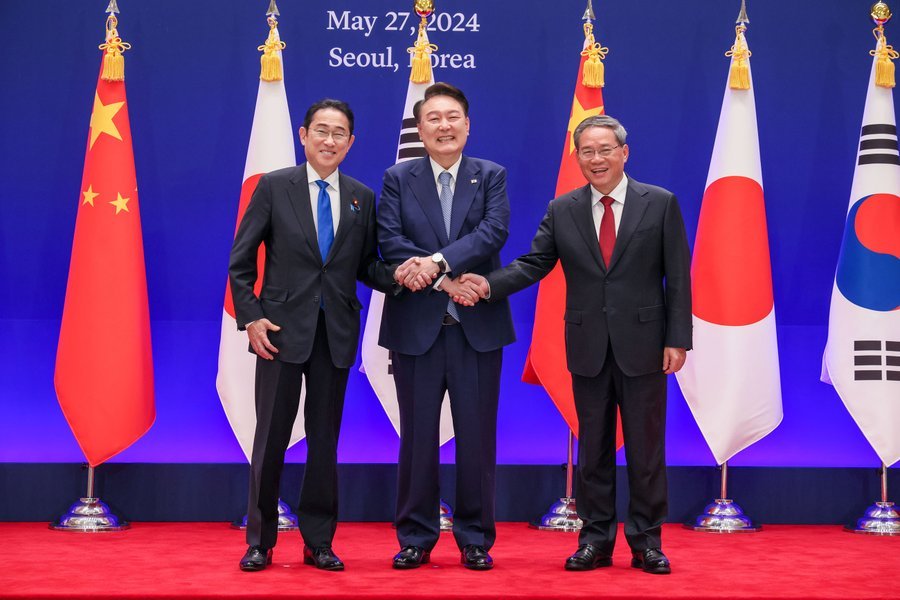Seoul, 28 May 2024 (TDI): The 9th China-Japan-ROK Summit took place in Seoul, South Korea, on May 27th. The three leaders also spoke on issues about the region and the world, as well as their thoughts on potential trilateral cooperation.
Additionally, China, Japan, and South Korea solidified their trilateral cooperation on Monday and emphasized that fostering goodwill and confidence should serve as the fundamental basis for their relationship.
They believe that this approach will not only benefit their own countries but also contribute to the peace and development of the region and beyond.
The trio of presidents commemorated the trilateral cooperation’s 25th anniversary and gave their blessing to the process’s revival.
Moreover, the three leaders also decided to keep up their work under Japan’s direction and to further encourage real cooperation that concentrates on forward-thinking projects in a variety of industries.
The epidemic and geopolitical disruptions caused the trilateral summit to stall for more than four years, but it produced several positive outcomes for strengthening collaboration across a range of sectors.
The Joint Declaration of the Ninth China-Japan-ROK Trilateral Summit, the Joint Statement on a 10-Year Vision for Trilateral IP Cooperation, and the Joint Statement on Future Pandemic Prevention, Preparedness, and Response are just a few of the major concrete results.
The eighth trilateral summit in Chengdu, southwest China, in December 2019 endorsed the Trilateral Cooperation Vision for the Next Decade, which the three parties also committed to implementing.
Moreover, At the eighth trilateral business summit among the three nations in Seoul, South Korea’s Yoon Suk-yeol, Chinese Premier Li Qiang, and Japanese Prime Minister Fumio Kishida engaged in extensive discussions. This was the ninth trilateral summit meeting.
Trilateral cooperation should not be hampered by outside disruptions, nor should the unity of the three Asian neighbors be obscured.
Particularly, the three countries’ leaders turned their attention to economic integration as the cornerstone of their alliance.
Furthermore, they have committed to improving trade connectivity, guaranteeing the stability and effectiveness of supply and industrial networks, and expeditiously resuming negotiations for the free trade agreement between China, Japan, and South Korea.
During the meeting, the leaders reaffirmed their dedication to advancing an atmosphere for trade and investment that is marked by inclusivity, transparency, freedom, openness, justice, and non-discrimination.
The chairman of the Korea Chamber of Commerce and Industry, Chey Tae-won, said that the summit conference marks an important turning point because all three economies have recovered well from the pandemic and are currently enjoying prosperity.
The head of the China Council for the Promotion of International Trade, Ren Hongbin, stressed the importance of fostering industrial cooperation, guaranteeing supply chain stability, and improving the investment climate.
Together with cooperation in commerce, science, technology, and the economy, the three presidents stated that they hoped the summit would mark a new chapter in the history of steady and ongoing cooperation.
Additionally, they sought to improve cooperation in six key areas: public health, science and technology, sustainable development, trade and economics, disaster assistance, and culture and people-to-people interactions.
However, there is a renewed focus on the development of cultural relations to foster mutual trust and understanding.
In addition, 2025–2026 will be formally recognized as the China–Japan–South Korea Year of Cultural Exchange during the meeting on Monday. The three sides also agreed to increase the number of face-to-face contacts between the three countries to 40 million by 2030 through the promotion of cultural, tourist, and educational exchanges.
The nations reiterated their commitment to becoming carbon neutral and presented specific plans to protect the environment to prepare for an environmentally viable future.
These tactics include encouraging collaboration in the preservation of marine ecosystems and collaborating with Mongolia to address the problem of dust and sandstorms in East Asia. They are also experts at handling the problems associated with an aging population.
Furthermore, the maintenance of regional peace and security is greatly dependent upon the three major Northeast Asian countries discussed.
The three sides reaffirmed their commitment to continuously make positive efforts to find a political solution to the Korean Peninsula issue in the joint declaration of the trilateral conference. They also highlighted efforts to improve cooperation in ASEAN and other international institutions.
The announcement by the three nations to create trilateral cooperation through institutionalization is praiseworthy, said Liu Qing, vice president of the China Institute of International Studies.
Also Read: China-Arab States unite on Palestine Issue at 10th Ministerial meeting
Through a commitment to consistent communication and cooperation, the three may address common issues and leverage their combined strengths for benefit.
“The increased emphasis on collaboration establishes an optimistic atmosphere for the future, in which Asia has the potential to become a fundamental element of tranquility and progress on the international stage,” Liu said.
Aisha Noor works for The Diplomatic Insight.



